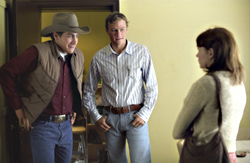Heterosexual men of Seattle, have I got a gay cowboy movie for you. As it continues to reap nominations, awards, and critical raves; as it expands to more Seattle theaters—even off Capitol Hill!—and reaches the red-state heartland, Brokeback Mountain presents a rare opportunity for guys who hate being dragged to an estrogen-infused chick flick. Here is a movie that (a) is really quite good, (b) contains no gratuitous tears or hugging, and (c) is entirely devoid of Celine Dion caterwauling on the soundtrack. Instead of Reese Witherspoon jumping up and down squealing in three octaves, instead of Kate Hudson fanning her hands like a helicopter, instead of Cameron Diaz boogying in her Underoos . . . OK, OK, I’m overreaching . . . you’ve got two rugged Wyoming ranch hands living quietly in a harsh but beautiful landscape, cooking by fire and working with their hands.
Oh, did I forget to mention the part about their having sex? And occasionally kissing? Well, Ang Lee’s dirty little secret to crossover appeal is that there’s actually less male frontal nudity here than in The Piano, less man ass than in Old School. The important reason for making Brokeback a date night is its very old-fashioned and universal tradition of romance, not the specifics of this one particular cowboy-boy coupling. Though the particular absences of girlie shopping sprees, triumphant makeover moments, and teary spoonfuls of Häagen-Dazs on the couch are certainly welcome. Plus there’s lot of campin’ and drinkin’ and roughhousin’, and nobody minds if a fellow doesn’t change his shirt for a few days.
Which doesn’t mean cowboys aren’t sensitive, no sir. They just keep their feelings in the corral. That’s why you shouldn’t admit to your sweetie that you know anything in advance about Brokeback. Just say, “Gee, Ang Lee’s Hulk was pretty good, and that Jake Gyllenhaal was pretty solid in Jarhead—how ’bout we check out this darn cowboy flick?” Chances are that she won’t want to correct your prior knowledge on the subject, especially if the dinner reservations are already made.
Normally, I discourage talking after the credits roll, but pulling in close to the ear can also invite a kiss, so here are a few possible whispering points: “Wyoming! It’s so beautiful. We should really take a trip there sometime.” “Aren’t those sheep adorable?” “That Randy Quaid is so mean!” (Know your Quaids! Randy is the Amish bowler in Kingpin; Dennis is the old pitcher in The Rookie.) “You know, that Anne Hathaway really isn’t so special, and I don’t get what Heath Ledger sees in Michelle Williams.” “I am so glad Jack finally told off his awful father-in-law. It is so rude to watch TV during a family meal.” “At least Ennis is there for his daughters when it finally counts.” “I think, deep in her heart, that Jack’s mother always knew.” Holding hands or conducting the old arm-over maneuver may be welcome about the time Ennis calls Jack’s wife in Texas. Use other hand to pass over clean tissues. (Clean! The ones that come in the little plastic package, not the napkin all covered with butter and salt.)
Dinner or drinks afterward is where you can really reap dividends, because that’s where feelings are discussed. Here, the movie critique is entirely symbolic— talking about Jack (Gyllenhaal) and Ennis (Ledger) is a way of talking about yourselves (which adds a whole different subtext to Ebert & Roeper). Look and listen for cues to elicit favorable comparisons with your date—how the movie reflects well on her and, by comparison, the both of you together. If you’d been forced to see Pride & Prejudice, instead of volunteering for Brokeback, you might already have been drawn into an awkward comparison regarding Keira Knightley. Now you can simply agree that Gyllenhaal’s butt is definitely bigger than the one sitting opposite you, and that he really could afford to pluck his eyebrows a bit more.
Then discuss how Ennis and Jack cemented their relationship without a lot of unnecessary chitchat. They weren’t constantly wasting their cell phone minutes or sending frivolous BlackBerry messages all day long from the office. Maybe one phone call a year, or a postcard, tops. Does that mean they didn’t love each other? Just the opposite. Fewer words make it count more. It’s the cowboy way.
Now praise the performance quality, how emotions are communicated by a look or glance. Just because Ledger’s laconic cowpoke doesn’t know how to express his feelings doesn’t mean he doesn’t have them. And notice how patient, for the most part, Gyllenhaal is with his partner—not always goading him to talk, or to go for walks on the beach, or to use pet names like Mr. Scrunchybottom. Nope. They’re content to let some issues lie, to let some things go unsaid.
Not like Hathaway and Williams, who are entirely too pushy. Don’t they kind of deserve to end up alone?
It’s NO SURPRISE that several different women fall for Ennis in the movie: He’s a man’s man and a woman’s man, which pretty much turns out to be the same thing. And his stoic, constant values are the ones you want to echo in your relationship, perhaps along these lines: “We could get ourselves a little spread. You always said you wanted to live in the country. We don’t need a big house or fancy car or expensive wedding. Hell, they couldn’t marry, and it didn’t change their feelins’ none.”
You don’t have to come out and say, “Ennis Del Mar, c’est moi,” but make the spiritual connection felt. Nothing says devotion like faithfully returning from a long cattle drive, or grueling software trade show, to the arms of your sweetheart. Just don’t make a big fuss over it (nor with picking up the tab for the movie and dinner). That’s what says, “I love you, but leave me to brood in manly silence.” And, more importantly, “Don’t cling.”








